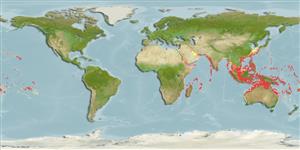Common names from other countries
>
Mulliformes (Goatfishes) >
Mullidae (Goatfishes)
Etymology: Parupeneus: Latin, parum, parvum = small + Peneus, the name of a river.
More on author: Lacepède.
Environment: milieu / climate zone / depth range / distribution range
นิเวศวิทยา
เกี่ยวกับทะเล,น้ำเค็ม เกี่ยวกับหินโสโครก; ระดับความลึก 0 - 100 m (Ref. 90102). Tropical; 34°N - 34°S, 22°E - 134°W
Indo-Pacific: Gulf of Aden and Oman, south on the east coast of Africa to Mossel Bay, South Africa, east to the islands of Micronesia, Line Islands, Marquesas Islands, and Tuamotu Archipelago; and from southern Japan to Australia and New Caledonia.
Length at first maturity / ขนาด / น้ำหนัก / Age
Maturity: Lm 19.2, range 13 - ? cm
Max length : 60.0 cm TL เพศผู้/กระเทย; (Ref. 9710); common length : 30.0 cm TL เพศผู้/กระเทย; (Ref. 30573)
เงี่ยงครีบหลัง (รวม) : 8; ก้านครีบอ่อนที่หาง (รวม) : 9; เงี่ยงครีบก้น: 1; ก้านครีบอ่อนที่ก้น: 7. This species is distinguished by the following characters: pectoral rays 16-18 (usually 17); gill rakers 6-7 + 20-25 = 26-31; body moderately elongate, depth 3.3-3.7 in SL; head length (HL) 2.6-3.0 in SL; snout length 1.45-2.1 in HL (relatively longer with growth); barbel length 1.4-1.6 in HL; longest dorsal spine 1.15-1.75 in HL (longer with growth); penultimate dorsal soft ray about equal to last ray in young, 1.2 in last ray in large adults; pectoral fins 1.5-1.75 in HL; pelvic fins 1.35-1.6 in HL. Colour of body whitish with a dark brown to black stripe (red on fish in deeper water) from upper lip through eye to below posterior part of second dorsal fin or anteriorly on upper caudal peduncle; body above stripe yellow or yellowish gray; body below whitish, scale edges narrowly gray to brownish red; a black or red spot larger than eye at the midbase of caudal fin; some large adults with centers of scales below dark stripe pale blue, the edges yellow or with yellow spots, especially posteriorly; peritoneum dark brown (Ref. 54393).
One of the most abundant species of Parupeneus (Ref. 37816). Adults, solitary or in small groups inhabit large sand patches as well as sand and rubble areas of reef flats, and lagoon and seaward reefs to a depth of about 100 m. Juveniles usually in small groups, often mixed with other species in sparse seagrass habitats (Ref. 48636). Adults forage on sand-dwelling invertebrates like polychaete worms and crustaceans. Feeding is diurnal; from 19 adult specimens for food-habit study, the prey in order by volume in the stomachs: crabs (portunid, anomuran, xanthid, and raninid), worms (mainly polychaetes but also sipunculids and unidentified), small bivalve molluscs, brachiopods, shrimps, small gastropods, isopods, amphipods, foraminifera, and a small unidentified eel (Ref. 54393). Individuals from Palau and eastern Carolines often have a yellow band immediately above the broad black band extending behind the eye (Ref. 37816). Minimum depth reported taken from Ref. 128797.
Mature individuals migrate shoreward to spawn and feed (Ref. 7002). Some immature Individuals with size ranging from 16.1 to 22.5 cm FL from this study are bisexual, however, this species is classified as a functional gonochore (Ref. 125700).
Randall, J.E., 2004. Revision of the goatfish genus Parupeneus (Perciformes: Mullidae), with descriptions of two new species. Indo-Pac. Fish. (36):64 p. (Ref. 54393)
IUCN Red List Status (Ref. 130435)
CITES (Ref. 128078)
Not Evaluated
Threat to humans
Harmless
Human uses
การประมง: การค้า; การตกปลาเป็นกีฬา: ใช่; สถานที่แสดงสัตว์และพืชน้ำ: การค้า
เครื่องมือ
Special reports
Download XML
แหล่งที่มาจากอินเตอร์เน็ต
Estimates based on models
Preferred temperature (Ref.
115969): 24.6 - 29, mean 27.9 (based on 1480 cells).
Phylogenetic diversity index (Ref.
82804): PD
50 = 0.5000 [Uniqueness, from 0.5 = low to 2.0 = high].
Bayesian length-weight: a=0.01148 (0.00925 - 0.01425), b=3.09 (3.06 - 3.12), in cm Total Length, based on LWR estimates for this species (Ref.
93245).
ระดับชั้นอาหาร (Ref.
69278): 3.4 ±0.38 se; based on food items.
ความสามารถในการกลับคืนสู่ปกติ (Ref.
120179): ขนาดกลาง, เวลาต่ำสุดที่จะทำให้ประชากรเพิ่มขึ้นเป็น 2 เท่าใช้เวลา 1.4 - 4.4 ปี (K=0.21-0.22).
Fishing Vulnerability (Ref.
59153): Moderate vulnerability (40 of 100).
